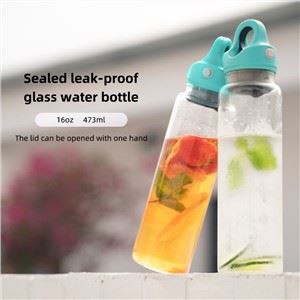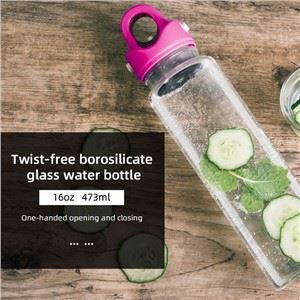Q: How long does water stay good in glass bottles?
A: If you're using tap water, it's recommended to store it for no longer than six months, as it may gradually lose its freshness over time. On the other hand, if you're using purified or distilled water, it can remain suitable for consumption for much longer.
Q: Is it safe to keep water in glass bottles?
A: Glass is the boss in the reusable water bottle category. It is the safest and best way to store both food and liquids for several reasons. Water in glass bottles isn't affected by any flavor from the container, giving it a “purity of taste” benefit when compared to plastic bottles and other options.
Q: How often should I change my glass water bottle?
A: Glass bottles are another great option and will last even longer than stainless steel bottles. However, they are more fragile and can break if dropped. No matter how careful you are, you need to change glass bottles every 2-3 years to ensure that your water stays clean.
Q: How do you store water in a glass bottle?
A: Fill bottles or jugs directly from the faucet. Cap tightly and label each container with the words "Drinking Water" and the date stored. Store sealed containers in a dark, dry, and cool place. If after six months you have not used the stored water, empty it from the containers and repeat steps 1 through 3 above.
Q: Can bacteria grow in glass water bottles?
A: Since the publications of the Franklands (1894) and Whipple (1901) it has become well established that when fresh water or sea water is stored in glass containers bacteria multiply rapidly to numbers which are often far in excess of those found under natural conditions.
Q: Do glass water bottles get mold?
A: Did you know it is recommended that water bottles are washed as often as you wash your drinking cups and glasses? If you don't, they can become smelly and mouldy so, keeping your family's water bottles clean and stored correctly is important. Filling your water bottles with fresh water is best.
Q: Do you have to wash glass water bottles?
A: Even if you just fill it with water, a biofilm of microorganisms can form, which can only be prevented by thorough cleaning. Just as with dishes, it is also advisable to clean water bottles regularly to prevent the formation of germs and bacteria.
Q: What are the benefits of glass water bottles?
A: Why Glass is Better
Glass water bottles are better for your health, better for the environment, easier to clean, more durable, and more aesthetically pleasing than metal water bottles.
Q: Does water stay cold in glass bottles?
A: Glass bottles are heavier to carry than other material types since they are made with thicker glass, to make up for durability. Lastly, glass bottles are not very insulated, meaning if you put cold or hot water in your bottle, it will return to room temperature.
Q: How do you disinfect a glass water bottle?
A: Add Bleach, Baking Soda, and Water. Add one teaspoon of bleach and one teaspoon of baking soda to the bottle, then fill it with cool water. Let it sit overnight. Rinse and Dry. Rinse thoroughly with warm water before following the drying instructions above.
Q: Are glass bottles hygienic?
A: Glass bottles might carry the least amount of germs because glass is less porous than plastic and metal. It's also easier to see if the inside is dirty.
Q: Do you need a sterilizer for glass bottles?
A: To sterilize glass and other heat-safe bottles: Put them in a pan and make sure they're completely covered with water. Let the water come to a boil, and boil the nipples and bottles for 5 minutes. Then, use soap and water to wash them.
Q: Why are glass water bottles expensive?
A: Where glass production differs from plastic is in the amount of energy required to manufacture each bottle.
Q: What are the pros and cons of glass bottles?
A: Pros and Cons of Glass Water Bottles, we review the facts The pros of Glass Water Bottles are that they are eco-friendly, durable, visually appealing, and chemical free to name a few.
Q: Are glass water bottles practical?
A: Modern glass water bottles are also quite hard-wearing. However it's unlikely that a glass water bottle will outlive a stainless steel one, they are just not as strong.
Q: Can bacteria grow in glass water bottles?
A: When fresh water or sea water is stored in glass containers bacteria multiply rapidly to numbers which are often far in excess of those found under natural conditions.
Q: Do glass water bottles leach?
A: Glass is the safest reusable water bottle material because it's chemical-free, made from natural materials, and dishwasher safe. Glass water bottles don't leach harmful chemicals into your water and is another way to reduce or avoid microplastics.
Q: How do you get mold out of a glass water bottle?
A: Fill it with warm water. Pour a little bleach in the water. Remove the lid of the bottle and submerge the lid and the bottle entirely in the bleach solution. The bottle will be fine, and all of the mold will be removed in a few minutes.
Q: Why are glass water bottles better?
A: Many plastics, and some metal, vessels contain bisphenol A (BPA), a chemical the Food and Drug Administration (FDA) began warning about in 2010 due to its correlation with cancer. Glass is the safest water bottle type because it's chemical-free, made from natural materials, and dishwasher safe.
Q: Why is it important to store water in glass bottles?
A: Glass bottles not just preserve the minerals but also ensure that the water remains fresh, and therefore better for your health and environment. Glass bottles, given their structure, can be recycled.

















